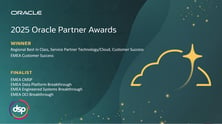PostgreSQL Migration
PostgreSQL Migrations
At DSP we are PostgreSQL Cloud Migration experts; whether you're migrating from on-premise, or from another Public Cloud. We have been delivering data management migrations, consulting and support for over 25 years and have seen all the pitfalls that a badly planned migration can throw at you.
We are equally at home spending 2 days migrating document storage to a cloud archive or spending 18 months migrating over 64,000 servers and associated applications as a greenfield implementation on cloud.
We are especially proud of our database platform expertise, recognised by Oracle and Microsoft as well as a the majority of Open Source developers which means we are one of few partners who are trusted by vendors and customers alike to deliver best practise cloud migrations. Our managed service pedigree means that on go-live of a successful migration, we can also manage that cloud environment for you.
Get in Touch
Main Benefits of Migrating to PostgreSQL
Ease of use
PostgreSQL is extremely easy to setup and configure. “Ease of use” was the second-most expected benefit by our pre-migration respondents (after cost reduction) and it retained its spot as a realized benefit from our post-migration responses, indicating that PostgreSQL truly lived up to its reputation of being easy to use.
Deployments are flexible
With the rise of DevOps, there is a demand for agile options for continuous deployment. PostgreSQL provides a variety of deployment options on multiple cloud and on-prem platforms, and supports scaling up for heavy workloads at no additional cost. The benefit of different options for deployment was cited by 29% of those planning to migrate to PostgreSQL, and confirmed by 32% of those who had already migrated.
Famed community support is a reality
PostgreSQL has had a vibrant user and developer community for the past three decades. What this means is that if you are facing an issue, it is very likely that a solution has been documented and possibly even has an extension built to resolve it. PostgreSQL’s rich extension library, detailed documentation, and real-world support, with no ulterior motives, resonates more-or-less equally with both the pre-migration and post-migration respondents of our Oracle to PostgreSQL Migration Report.
Licensing complexity is reduced
Moving to an OSDBMS like PostgreSQL not only saves licensing costs, but also saves the hassle of license management. Oracle’s licensing contract, the Software Investment Guide, can be complex and non-transparent to navigate through, often stymieing SMBs with confusing fine-print. Nearly one-third of the organizations surveyed for the report cited a reduction in licensing complexity after migrating to PostgreSQL; slightly more than the number that expected it.
Dreaded audits are done away with
Oracle’s audits inspire fear and dread with its aggressive tactics and draconian fines. It is infamous for its Audit Bargain Close model where it permits the download of any/all of its tools, after which the client is subject to strict auditing and violations are used as leverage to push clients to sign new deals, in particular for Oracle Cloud. PostgreSQL, with its open-source model, does away with audits of any kind – a benefit expected and met by a quarter of our survey respondents.
A feature-rich platform
Oracle releases updates every couple of years, but as with any large enterprise solution, the product roadmap is driven by its profitability to a single vendor, and the demands of a few lucrative clients. This leads to a product with myopic updates that play it safe rather than push innovation. PostgreSQL, on the other hand, benefits from committed and collaborative developer inputs, that have continued for decades. Thus PostgreSQL not only has the solid foundation of a comprehensive extension library, but it is also regularly updated with new features that keep up with the latest market and tech demands. Based on our survey responses, the expectation of benefiting from a feature-rich and relevant platform was met by those having already migrated to PostgreSQL.
DSP Migration Methodology
Discover
The first step when migrating our customers to PostgreSQL is to conduct an in-depth discovery call. This call will consist of understanding exactly what kind of cloud model will suit your business the best. Whether that's a full migration to PostgreSQL or a partial hybrid, Cloud@Customer approach or even as a component in a multi-cloud strategy.
This discovery call will involve a PostgreSQL Data Architect, as well as your dedicated Account Director so you can understand both the technical and commercial sides of any potential cloud model.
You should leave this stage knowing which approach is right for you as well as other commercial and technical impacts; such as how to design for redundancy and availability.
Migrate
With the cloud model now agreed, the next stage of the PostgreSQL Cloud Migration process is the actual migration.
The Data Architect who joined your discovery call will stay with you throughout your journey to cloud, and will lead a team of certified PostgreSQL Engineers to carry out the migration. The scope of the migration will be unique to you. However, what is consistent is that every migration includes a transition into support to ensure your cloud environment is ready to go when handed over.
Manage
After a successful migration, the majority of our customers then continue with an DSP Managed Service. This entails proactive monitoring of your PostgreSQL environment on a 24*7*365 basis, with built in health checks. Allow DSP to manage your cloud environment, so you can focus on managing your business.
Continue Your Journey to PostgreSQL
Whether you are in need of temporary storage to support an office move, a hybrid strategy to support a mix of sensitive applications, assistance in developing a multi cloud strategy or an urgent move to support a hardware failure, DSP have the skills and relevant experience to move you to PostgreSQL (or OCI and Azure).
Use the form below to contact us for a no obligation, funded workshop or PoC to see where PostgreSQL can support your business.



.png?width=250&height=56&name=stonewater-logo%20(1).png)


